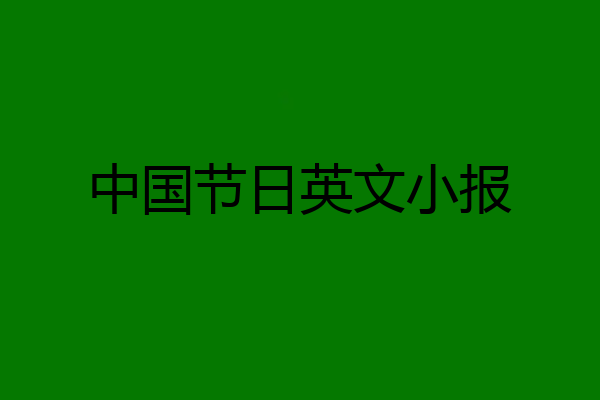
毕筱倩mm
这是一篇关于中国农历新年--春节的英语手抄报,图片中的手绘精美大方,手抄报主要是春节习俗的,包括了三个方面的习俗内容1)Pasting Spring Couplet春联英语介绍 2)Set off firecrackers 放鞭炮的英语介绍3)Sweeping the dust扫尘的英语介绍。Pasting Spring Couplet春联英语介绍中英对照:“The Spring Couplet”, also called “couplet” and “a pair of antithetical phrases”, is a special form of literature in China. The Spring Couplet is composed of two antithetical sentences on both sides of the door and a horizontal scroll bearing an inscription, usually an auspicious phrase, above the gate. The sentence pasting on the right side of the door is called the first line of the couplet and the one on the left the second line. On the eve of the Spring Festival, every household will paste on doors a spring couplet written on red paper to give a happy and prosperous atmosphere of the Festival. In the past, the Chinese usually wrote their own spring couplet with a brush or asked others to do for them, while nowadays, it is common for people to buy the printed spring couplet in the market.“春联”也被称为和“对联”对立的一对短语,在中国是一种特殊的文学形式。春联是由贴在门口两侧两组对立的句子组成,在门上面的横批通常是一个吉祥的短语。贴在门右侧的句子被称作对联的上联,左侧的为下联。除夕那天,每家都会在门上贴上红纸写的春联,传递出节日喜庆和热闹的气氛。在过去,中国人通常用毛笔自己写春联或者请别人写春联,而现在,人们普遍在市场上买印刷好的春联。Set off firecrackers 放鞭炮的英语介绍:The firecracker is a unique product in China. In ancient China, the sound of burning bamboo tubes was used to scare away wild animals and evil spirits. With the invention of the gunpowder, “firecracker” is also called “鞭炮biānpào” (“炮” in Chinese means gun) and used to foster a joyful atmosphere. The first thing every Chinese household does is to set off firecrackers and fireworks, which are meant to bid farewell to the old year and usher in the new. In the past few years, such an activity was completely or partially forbidden in big cities including Beijing due to fire and personal casualty caused by burning firecrackers. However, some Chinese thought that a Spring Festival without firecrackers was not lively enough and they burned firecrackers by stealth. So in recent years, the ban was canceled again. This shows that burning firecrackers is a very important activity during the Spring Festival.Sweeping the dust扫尘的英语介绍中英对照:“Dust” is homophonic with “chen”(尘)in Chinese, which means old and past. In this way, “sweeping the dust” before the Spring Festival means a thorough cleaning of houses to sweep away bad luck in the past year. This custom shows a good wish of putting away old things to welcome a new life. In a word, just before the Spring Festival comes, every household will give a thorough cleaning to bid farewell to the old year and usher in the new. “Dust”与“尘”是谐音(尘在汉语中的意思是旧的和过去的)。这样,“在春节前扫尘”是指彻底清洁房屋扫除过去一年的厄运。此习俗表达了收拾旧事物,欢迎新生活的美好愿望。总之,就在春节到来之前,为了告别旧年迎接新年,家家户户都会彻底打扫一下房屋。


jinyulan1985
中国所有传统节日的英语单词如下:
春节 the Spring Festival ( New Year's Day of the Chinese lunar calendar)
农历正月初一 元宵节(灯节) the Lantern Festival
农历正月十五 端午节 the Dragon-Boat Festival
农历五月初五 元旦(1月1日)New Year's Day
春节(农历一月一日)the Spring Festival
元宵节(农历一月十五日)the Lantern Festival
国际劳动妇女节(3月8日)International Working Women'sDay
植树节(3月12日)Arbor Day
邮政节(3月20日)Postal Day
世界气象节(3月23日)World Meteorology Day
清明节(4月5日)Ching Ming Festival;Tomb-sweeping Festival
国际劳动节(5月1日)International Labour Day
中国青年节(5月4日)Chinese Youth Day
护士节(5月12日)Nurses'Festival
端午节(农历五月初五)the Dragon Boat Festival
国际儿童节(6月1日)International Children's Day
中国共产党成立纪念日(7月1日)the Party's Birthday
建军节(8月1日)the Army's Day
中秋节(农历八月十五)Mid-autumn(Moon) Festival
教师节(9月10日)Teachers'Day
重阳节(农历九月九日)Double-ninth Day
国庆节(10月1日)National Day
除夕(农历十二月三十日)New Year's Eve
外国节日的英语表达如下:
Advent (耶稣)降临节Lady Day, Annunciation 天使报喜节(3月25日)Ascension Day 耶稣升天节(复活节后第四十日)Assumption 圣母升天节(8月15日)Candlemas 圣烛节(2月2日)New Year, New Year's Day 新年(1月1日)

foxbaby168
如学习人体部位单词时,突出操练部位单词。
let's do: Head, head, touch your head. Face, face, touch your face. Nose, nose, touch your nose. Mouth, mouth, touch your mouth.
学习水果单词时,自编以下let's do: Apple, apple, draw an apple. Pear, pear, draw a pear.
其他英文:
1、我有一个大家庭,familly,familly是家庭。
2、爷爷外公grandfather,还可叫他grandpa.
3、奶奶外婆grandmother,还可叫她grandma.
4、父亲爸爸叫father,还可叫他dad,daddy.
5、母亲妈妈叫mother,还可叫她mum,mummy.
6、daddy,mummy工作忙,咱们去见sister.
7、姐姐妹妹sister,哥哥弟弟brother.
8、还有一个小小的我,me,me就是我,日子过得so happy.
优质英语培训问答知识库